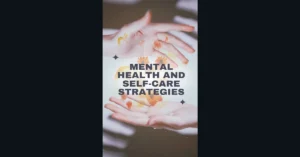Introduction
In today’s fast-paced world, taking care of your mental health and overall well-being is crucial. Stress, anxiety, and other mental health issues can significantly impact your quality of life. However, by incorporating simple practices into your daily routine, you can enhance your mental health and promote a sense of well-being.
Here are Five Simple Ways to Improve Your Mental Health and Wellness:
1. Practice Mindfulness
Mindfulness is the practice of being fully present in the moment, aware of your thoughts, feelings, and bodily sensations without judgment. By incorporating mindfulness into your daily routine, you can reduce stress, improve focus, and enhance your overall well-being. Try dedicating a few minutes each day to mindfulness meditation or engage in activities such as yoga or deep breathing exercises.
2. Engage in Regular Physical Activity
Physical activity not only benefits your physical health but also plays a vital role in improving your mental well-being. Participating in regular exercise stimulates the production of endorphins, which act as natural mood elevators. Whether it’s going for a brisk walk, jogging, cycling, or practicing a sport you enjoy, incorporating physical activity into your routine can help reduce stress, improve sleep, and enhance your overall mood.
3. Foster Meaningful Relationships
Maintaining strong and meaningful relationships is essential for your mental health. Humans are social beings, and connecting with others can provide a sense of belonging, support, and fulfillment. Nurture your relationships with family, friends, and loved ones by spending quality time together, actively listening, and offering support when needed. Engaging in social activities and joining clubs or organizations can also help you meet new people and expand your social network.
3.1. Prioritize Communication
Open and honest communication is the foundation of healthy relationships. Expressing your thoughts and emotions, as well as actively listening to others, can strengthen connections and foster understanding. Make an effort to communicate your needs effectively and encourage others to do the same.
3.2. Surround Yourself with Positive Influences
Surrounding yourself with positive, supportive individuals can have a significant impact on your mental well-being. Seek out people who uplift and inspire you, avoiding toxic relationships that drain your energy and bring negativity into your life.
4. Prioritize Self-Care
Self-care involves taking deliberate actions to prioritize your physical, mental, and emotional well-being. Allocate time for engaging in activities that bring you joy, relaxation, and renewal. This can include hobbies, engaging in creative outlets, practicing self-reflection, and setting boundaries to ensure you have time for yourself. Remember that self-care is not selfish but essential for maintaining your mental health.
4.1. Practice Healthy Lifestyle Habits
Adopting healthy lifestyle habits contributes to your overall well-being. This includes getting enough sleep, maintaining a balanced diet, limiting alcohol and caffeine consumption, and avoiding smoking or drug use. These habits can positively impact your mood, energy levels, and overall mental health.
4.2. Set Realistic Goals and Prioritize Tasks
Setting realistic goals and breaking them down into manageable tasks can reduce feelings of overwhelm and promote a sense of accomplishment. Prioritize your tasks based on their importance and tackle them one step at a time. Celebrate your achievements, no matter how small, as it can boost your self-esteem and motivation.
5. Seek Professional Help
If you’re experiencing persistent or severe mental health challenges, don’t hesitate to seek professional help. Mental health professionals, such as therapists or counselors, are trained to provide guidance, support, and evidence-based treatments for various mental health conditions. Seeking professional help is a sign of strength and can lead to significant improvements in your overall well-being.
Conclusion
Taking care of your mental health and well-being should be a priority in your life. By practicing mindfulness, engaging in regular physical activity, fostering meaningful relationships, prioritizing self-care, and seeking professional help when needed, you can make significant strides in improving your mental health. Remember, small changes in your daily routine can have a profound impact on your overall well-being.
FAQs
1. How long does it take to see improvements in mental health through these practices?
The time it takes to see improvements in mental health varies from person to person. Some individuals may notice positive changes relatively quickly, while others may take longer. Consistency and patience are key when incorporating these practices into your routine.
2. Can I practice mindfulness without meditating?
Absolutely! Mindfulness can be practiced in various ways. While meditation is a popular mindfulness practice, you can also cultivate mindfulness through activities such as mindful walking, eating, or even simply being fully present in your daily tasks.
3. How frequently should I engage in physical activity to boost my mental health?
To improve your mental health, it’s recommended to engage in at least 150 minutes of moderate-intensity aerobic exercise or 75 minutes of vigorous-intensity exercise per week. However, any form of physical activity is beneficial, so find what works best for you and incorporate it into your routine.
4. Is it necessary to seek professional help if my mental health is relatively stable?
Even if your mental health is relatively stable, seeking professional help can provide valuable insights, guidance, and support. Mental health professionals can help you explore any underlying issues, develop coping strategies, and provide tools for maintaining good mental health in the long run.
5. When faced with a busy schedule, what steps can I take to prioritize self-care?
Incorporating self-care into a busy schedule can be a challenge, but it’s important to start by identifying small time slots that can be dedicated to self-care activities. It could be as simple as taking short breaks during the day to engage in deep breathing exercises or practicing gratitude. Remember, even a few minutes of self-care each day can make a difference





Pingback: Stress-Free Living: The Power Of Progressive Muscle Relaxation - Bitsify